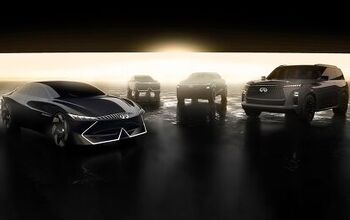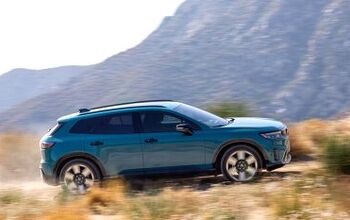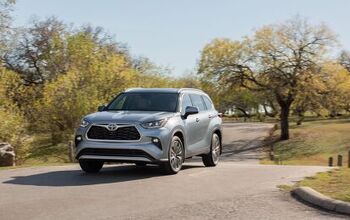Does Efficiency-Per-Performance Matter?
We’ve already been impressed enough with the McLaren MP4-12C’s 3.8 liter turbocharged V8 to say it “looks like mechanical sex” and give it its own gallery. The super-compact, direct-injected engine develops in the neighborhood of 600 hp, giving the new McLaren the dangly bits to show a (similarly-priced) Ferrari 458 the way around a racetrack. And though McLaren clearly thinks the MP4-12C’s race-tested abilities will help build its brand into the new race-nerd standard, it’s also beating Ferrari at a new game that will become increasingly important with time: the C02-per-horsepower game. Ferrari’s 570 hp V8 emits 320 grams of C02 per kilometer, giving the Fezza a rating of .56 grams of C02 per km per horsepower. McLaren’s goal for its not-quite finalized MP4-12C drivetrain is a C02 emissions rating of below 300 gm per km, which would give the supercar closer to a .5 gram per km per horsepower rating. And though the direct-injected, downsized and turbocharged engine helps keep that number down, the MP4-12C’s dry weight is also 176 lbs lighter than the 458’s (2,866 versus 3,042).
And McLaren isn’t alone in pushing the limits of power-per-carbon. BMW’s forthcoming Efficient Dynamics supercar will reportedly offer M6 performance (500 hp) with a third of the carbon emission of the V10-powered M6, giving it a projected C02 per km per hp figure of .454, although unlike the 458 and MP4-12C, it will meet that goal using electric engines powered by a three-pot diesel engine. Like Porsche’s 918, the Efficient Dynamics is part of the next-generation of sportscars that leaves pure-gas drivetrains behind. The future of efficiency-per-performance looks good, but only when measured in carbon. Meanwhile, the fact that BMW’s switch to a hybrid-electric drivetrain will only reduce C02 by as much as McLaren was able to improve on Ferrari’s design through downsizing, direct-injection, turbocharging and weight reduction shows how much more efficient all gas engines can be.
But here’s the real question: does carbon-per-horsepower matter? After all, 300 gm per km is still over twice the EU’s 2015 average emissions goal. The MP4-12C is no “green car,” but if you assume that supercars will continue to exist, the relationship between power and efficiency will become a more important measure over time. After all, a 89 g/km Prius breaks down to .66 grams per km per horsepower, worse even than the 458. If this new relativist perspective doesn’t take hold, government regulations will eventually become strict enough to force certain levels of performance into the realm of electric vehicles or complex hybrids. The Efficient Dynamics and 918 show that this isn’t the end of the world, but for now the MP4-12C is looking like one of the most accomplished of what may be the last generation of pure-gas supercars. Whether this technical achievement translates into brand equity and sales, however, is an entirely different question.
More by Edward Niedermeyer
Latest Car Reviews
Read moreLatest Product Reviews
Read moreRecent Comments
- David Murilee Martin, These Toyota Vans were absolute garbage. As the labor even basic service cost 400% as much as servicing a VW Vanagon or American minivan. A skilled Toyota tech would take about 2.5 hours just to change the air cleaner. Also they also broke often, as they overheated and warped the engine and boiled the automatic transmission...
- Marcr My wife and I mostly work from home (or use public transit), the kid is grown, and we no longer do road trips of more than 150 miles or so. Our one car mostly gets used for local errands and the occasional airport pickup. The first non-Tesla, non-Mini, non-Fiat, non-Kia/Hyundai, non-GM (I do have my biases) small fun-to-drive hatchback EV with 200+ mile range, instrument display behind the wheel where it belongs and actual knobs for oft-used functions for under $35K will get our money. What we really want is a proper 21st century equivalent of the original Honda Civic. The Volvo EX30 is close and may end up being the compromise choice.
- Mebgardner I test drove a 2023 2.5 Rav4 last year. I passed on it because it was a very noisy interior, and handled poorly on uneven pavement (filled potholes), which Tucson has many. Very little acoustic padding mean you talk loudly above 55 mph. The forums were also talking about how the roof leaks from not properly sealed roof rack holes, and door windows leaking into the lower door interior. I did not stick around to find out if all that was true. No talk about engine troubles though, this is new info to me.
- Dave Holzman '08 Civic (stick) that I bought used 1/31/12 with 35k on the clock. Now at 159k.It runs as nicely as it did when I bought it. I love the feel of the car. The most expensive replacement was the AC compressor, I think, but something to do with the AC that went at 80k and cost $1300 to replace. It's had more stuff replaced than I expected, but not enough to make me want to ditch a car that I truly enjoy driving.
- ToolGuy Let's review: I am a poor unsuccessful loser. Any car company which introduced an EV which I could afford would earn my contempt. Of course I would buy it, but I wouldn't respect them. 😉


































Comments
Join the conversation
Why does CO2 per hp matter? One, it's a direct measurement of fuel efficiency, so it doesn't really differ from L/100km or MPG save for it's measuring hydrocarbons on the way out. So other than feel-goodness it's kind irrelevant as well already have a fuel usage yardstick. I'm not a chemist, so maybe I'm missing something, I don't see why this would be useful unless you're going to replace fuel usage metrics we already have. Second, and this concerns me, wouldn't this lead to gaming of the system by favouring learn-burn? Assuming you could get by emissions regulations for NOx?
WTF? What a meaningless metric this is. Why hp and not say top speed, weight or vehicle cost. Multiplying the CO2/Km by the average distance driven might come down legitimately in the favour of a super-car. but CO2 /hp is ridiculous, by this measure a top fuel dragster might be fairly frugal given they use nitromethane not petrol (different stoicometric). While we're at it express the average distance driven in furlongs to maintain the mish-mash of SI and Imperial units.